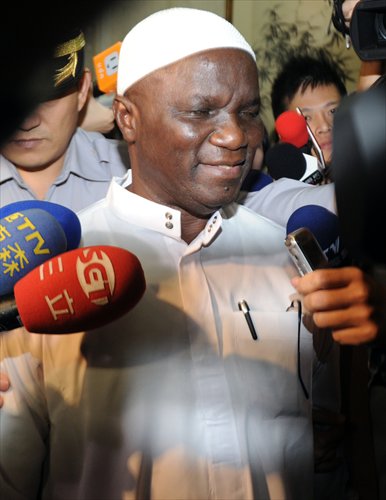Gambia drops Taiwan for prize of 'bigger China'

"Gambian Ambassador" to Taiwan Alhaji Ebrima N.H. Jarjou is surrounded by the press at the foreign department in Taipei on November 15. Taiwan expressed shock and regret over Gambia's surprise announcement that it had broken off ties with Taiwan. Photo: AFP
Gambian President Yahya Jammeh's announcement of the end to his country's 18-year relationship with Taiwan last month shocked not only Taiwanese officials but local experts who were aghast and left striving to decipher the sudden move by the president.
Gambia's move now leaves Taiwan with Swaziland, São Tomé and Príncipe, and Burkina Faso as the only three African countries diplomatically attached to the island.
Just last year, the two sides' relationship had seen a mutual "state officials visit." Taiwan leader, Ma Ying-jeou in November last year visited Banjul and toured a number of projects and institutions Taiwan supported.
The visit also saw the awarding of the visiting leader with the prestigious honorary Grand Commander of the Republic of The Gambia by his host.
While announcing the cutting of ties, Jammeh also said that his country remains friends with Taiwan.
Relations restored
Gambia restored both diplomatic and political relations with Taiwan in 1995, a year after the military coup that ended 30 years of the People's Progressive Party rule.
Eighteen years on, the relationship has seen both sides bending over backwards to make sure that they met their part of the bargain.
Taiwan has made great investments that seem to have left great impact on Gambia, especially in agriculture, trade, philanthropy, education, defense and health.
Taiwan has also helped modernize the Yundum military barracks, installed city streetlights, and rehabilitated Banjul-Serrekunda highway, as well as constructing schools.
The Asian island also helped build Gambia Radio and Television Services satellite, construct the Sankuleh Kunda bridge and procure engines for Gambian ferries.
Data from the ministry of education in the African country shows that about 200 Gambian students have studied in Taiwan over the past 10 years, graduating in diverse disciplines.
Recently, Taiwan also equipped Gambian hospitals with the latest medical equipment.
While Taiwan has invested large sums of money into Gambia's development basket, Gambia has continued to advocate for the island of 23 million taking part in the UN and other international organizations.
For example, at the 68th Session of the UN General Assembly in September, President Jammeh called for Taiwan's full participation in the activities of the international community.
Displeasing results
Experts say the answer to why Gambia cut its relationship with Taiwan so suddenly lies in an interview Jammeh granted a reporter with the UK-based New African Magazine following his surprise announcement that Gambia was pulling out of the Commonwealth in September.
Jammeh told the reporter that his country would not bow to any institution, government or club that has vestiges of colonialism, reiterating that the warning was not limited to "just the Commonwealth."
Although Gambian experts agree that there are no direct indications that the Chinese mainland had anything to do with the move taken by President Jammeh to cut ties with Taiwan, they posit that it is possible that Gambia didn't get what they might have wanted from Taiwan.
Oumaru Sessay, a Gambian political analyst based in Nairobi, Kenya told The Global Times that although Taiwan came to Gambia to address poor market access, logistical and economic infrastructures, this might have been done in a way that could have displeased Jammeh.
Zhang Zhenglin, a professor with National Taiwan University, told the Global Times in an earlier interview that there are some countries swinging between the Chinese mainland and Taiwan to achieve the best outcomes for their interests.
According to Zhang, during the rule of Lee Teng-hui and Chen Shui-bian, Taiwan's dollar diplomacy gave these countries enough space to bargain with Taiwan in exchange for retaining "diplomatic relations."
"However, since Ma Ying-jeou took office and adopted the policy of 'diplomatic truce' with the Chinese mainland, it became difficult for these swing countries to make profits from playing both sides," said Zhang.
Understandable action
What is not in doubt, however, is that a look over the African leader's shoulders at their neighbors will show the Chinese mainland's great development signatures thanks to $200 billion investments into Africa, according to 2012 estimates.
Samate Sankareh, an economist, does not rule this out as being more of a reason for President Jammeh to take the action he did. He said Jammeh has simply realized that "he stood better chance with the bigger China."
Speaking to the Gambian Press days after Jammeh announced the end of Gambia-Taiwan relations, Muhammed Jah, owner and CEO of QCell GSM Co, said with rising Chinese investments in the region, he supports Jammeh's move as Gambian businesses stand "better opportunities elsewhere and not Taiwan."
He was non-committal in his answer on whether he wants the president to establish links with the Chinese mainland.
Zhang said that the Chinese mainland seems to have no intention to compete with Taiwan for its diplomatic allies.
Li He, a research fellow with the Chinese Academy of Social Sciences, told the Global Times that it's natural for countries to pursue advantages and avoid disadvantages. "It is obvious that the Chinese mainland's economic strength and development trend is much stronger than Taiwan."
"In recent years, the Chinese mainland has put large investment into Africa and Latin America, which has pushed the two regions' development," said Li, adding that the trend urged these countries to draw closer with the mainland.
Liu Yunlong contributed to this story